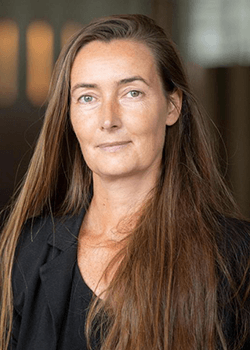Mensa Foundation Honors Danielle Posthuma for Research Identifying Genes Correlated with Intelligence
- Aug 3, 2021
Geneticist at Vrije Universiteit Amsterdam awarded $10,000 Mensa Foundation Prize

HURST, TEXAS, Aug. 3, 2021 — Statistical geneticist Dr. Danielle Posthuma of the Netherlands has been awarded the third Mensa Foundation Prize for her research directly identifying, for the first time, hundreds of human genes highly correlated to variations in intelligence. Endowed by the estate of Kenneth Douglas Thomson and awarded biennially by the Mensa Foundation, the $10,000 prize recognizes the best scientific discovery in the field of intelligence or creativity.
“Genetic science and engineering is currently the hottest topic in biology — witness its impact on Covid-19,” said Prize Committee Chair Dr. Harry Ringermacher. “Dr. Posthuma’s studies of genetic correlation with intelligence are the first to succeed in identifying specific genes within the human genome. Her credentials, visibility in her field, and publications were also excellent.”
As head of the Department of Complex Trait Genetics at the Vrije Universiteit Amsterdam and Amsterdam University Medical Centre, Dr. Posthuma leads a group of 30 researchers from diverse fields, including statistics, stem cell biology, and bioinformatics. She has led two large-scale genetic discovery studies into intelligence. The first, whose results were published in 2017, led to the discovery of 52 genes linked to intelligence. A year later, in an even larger study of more than 200,000 people, Dr. Posthuma was able to identify another 939 genes associated with intelligence.
She is the lead author on innovative statistical tools such as MAGMA (for gene-set analyses) and FUMA (for post-genome-wide association studies annotation), which she has also used on large-scale studies for Alzheimer&rsqu;s disease, insomnia, and neuroticism.
“Intelligence is one of the most highly investigated traits in psychology and also one of the most heritable traits in humans,” Dr. Posthuma said. “Heritability estimates range from 40 percent in childhood up to 80 percent in adulthood. Despite these high estimates of heritability, the actual genes have long remained elusive. Initial large-scale genetic discovery studies were mostly underpowered but did show that intelligence is highly polygenic and influenced by many genetic variants each of small effect.”
Dr. Posthuma estimates that the current genetic results explain up to about 10 percent of heritable traits related to intelligence, with future studies expected to expand the knowledge even further.
“I’ve always been intrigued to know why it’s so easy for some people to learn something, to study, and why it’s much more difficult for other people,” Dr. Posthuma said. “I would really like to understand, what is the underlying mechanism? […] So it’s like with other complex traits; it’s still something that we have to sort out. And so that requires a lot of biological knowledge — connecting the dots between the different genes, sorting out what these genes are doing in a human cell and how they connect to each other or how they form protein complexes. And that’s actually work that’s still ongoing, not only in our lab but also in other labs around the world.”
# # #
The Mensa Education and Research Foundation exists to foster intelligent solutions to real-world problems, encourage and promote diverse perspectives, and recognize those making contributions toward our understanding of intelligence. For 50 years, the Mensa Foundation has provided scholarships, promoted research, championed gifted youth, and empowered educators. Governed by a volunteer Board of Trustees, the Mensa Foundation is a 501(c)(3) organization funded by American Mensa, Mensa members, and other charitable donations.